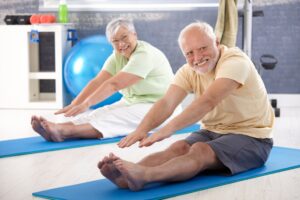Why 50+ fitness is important
There is no escaping the ageing process but we can certainly do our bit to stay fit, healthy and active as we reach the 50+ age bracket.
There is a temptation as we get older to slow down and put our bodies under less stress. Instead of going for a jog, we go for a walk; instead of carrying heavy bags from the supermarket, we get a home delivery. But that is not the approach that we should be taking if we want to stay active throughout our lives.
Combat the muscle loss
We all know that once we reach 50+ our muscles start to lose mass – in fact that process starts earlier but really speeds up post 50. This means our metabolism slows down as we have less muscle mass to use energy and burn calories. A decrease in muscle mass can also makes us mentally less ‘sharp’.
The benefits of continuing to do exercise into your 50+ years are well documented and yet people shy away from exercise. It has been estimated that well over half of 50+ people in the UK do little or no exercise – it is a trend that seriously needs reversing.
Huge benefits of exercise for the 50+ generation
Exercise for people in the 50+ bracket will improve joint mobility, increase physical strength, raise energy levels, enhance sleep and cognitive function and prevent illness.
The reasons for giving up on activity are numerous. For some people, it is just a reaction to a number. “I’m 50, it is no longer appropriate for me to be running around a football pitch. People of my age play golf.”
Other people feel there is a greater risk of injury – and this can be true, but the more you exercise, the less likely you are to have weak and fragile bones or poor mobility and balance.
50+ at Kelsey Kerridge
There may also be a lack of opportunity or support. Many 50+ people may not feel they are welcome in a activities that are mainly aimed at 20-30 year olds. At Kelsey Kerridge we offer 50+ exercise classes and will always encourage people of all ages to take part in all our classes and activities.
Exercise for older people is vitally important for mental health. The years from 50 onwards are often accompanied by feelings of uncertainty about your place in the world. Post-retirement can bring its own issues, such as boredom, anxiety and stress. There can be a loss of identity or purpose. A regular fitness regime, combined with the sociability factor that comes from going to the gym, will help alleviate this.
By keeping fit and strong in the body, the mind will undoubtedly benefit too. There is science behind this. The protein BDNF (Brain-derived neurotrophic factor) stimulates repair and regeneration of both nerve and brain cells. The secretion of BDNF can dramatically reduce the risk of dementia and cognitive disease. And exercise has been shown to increase the secretion of BDNF.
Total body benefits
It’s not just the brain, but the whole body that benefits from exercise as we get older. Dr Barbara Bushman of the American College of Sports Medicine says that regular physical activity can minimise the physiological changes that occur with age: “Older adults can benefit from exercise, and although absolute improvements may be less than for younger adults, relative increases can be similar.”
An ideal exercise programme for 50+ people should include a combination of balance, stretching, cardiovascular and weight training.








